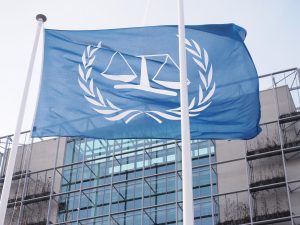Philippine President Ferdinand Marcos Jr. has again stated that his administration will not cooperate with an International Criminal Court (ICC) investigation into his predecessor’s violent “war on drugs.”
Speaking to reporters yesterday, Marcos said that he saw the ICC probe as “a threat to our sovereignty.”
“Let me say this for the 100th time. I do not recognize the jurisdiction of the ICC in the Philippines… The Philippine government will not lift a finger to help any investigation that the ICC conducts,” Marcos said, BenarNews reported.
He added that ICC staff will not be barred from entering the country, as they were under Duterte, but that the government would monitor them, “making sure that they do not come into contact with any agency of the government.”
Duterte’s anti-drugs campaign, a signature policy that began the moment that he was sworn into office in mid-2016, claimed thousands of lives, by the government’s account; some human rights groups put the death toll as high as 12,000, including many children and innocent victims.
The campaign quickly caught the attention of ICC investigators. In late 2020, then ICC chief prosecutor Fatou Bensouda announced that a preliminary probe had found “a reasonable basis to believe that the crime against humanity of murder has been committed on the territory of the Philippines” between July 1, 2016, when Duterte came to office, and March 16, 2019, when Duterte announced that the Philippines was withdrawing from the court.
The ICC investigation also covers extrajudicial killings allegedly committed during Duterte’s time as mayor of Davao City in the southern Philippines from November 2011 to June 2016.
In September 2021, judges at the ICC authorized an investigation into the anti-drug campaign. The probe has since proceeded through various stages of appeal, as Manila has pursued every legal means to derail and delay the investigation.
This included a request for a deferral in November 2021, on the grounds that the Philippines was pursuing its own judicial process regarding the drug war, which was ended by a Pre-Trial Chamber decision in January 2023. The Philippines then appealed this decision, which was rejected by ICC judges in July, finally allowing an investigation to begin.
Marcos’ remarks came after Justice Secretary Jesus Crispin Remulla said in an interview with Kyodo News that the government might allow an ICC investigation to proceed if legal procedures were followed.
“We’re not here to stop them because if they’re not doing anything illegal, there’s nothing wrong with that,” he told the Japanese news outlet. “If they’re getting statements, they’re getting evidence. It’s okay,” he added. “But we have to clarify many issues, especially about procedure.” This appeared to mark a shift in tone from Remulla, who had previously described the investigation as “insulting” and “totally unacceptable.”
Duterte’s camp has maintained its hostile position toward the ICC. Vice President Sara Duterte, the daughter of the former president who is reportedly also a secondary respondent in the ICC investigation, said yesterday that she “will not participate or be part of the process that will not only bring shame to the country, but also crush the dignity of our judges, courts, and the entire justice system of the Philippines.”
Salvador Panelo, Duterte’s former presidential spokesperson took much the same line.” Allowing the ICC to conduct its probe in our country, in brazen violation of the constitution, is an absolute surrender of our birthright as a sovereign nation,” he told Reuters.
In November, Marcos said that the Philippines was considering resuming its membership of the ICC, but that his administration still needed to deal with questions of jurisdiction and sovereignty that he said were “fundamental.”
The comments came at a time of apparent tension between the Marcos and Duterte camps, which united in 2022 and won a decisive victory at the presidential election in May of that year. Nonetheless, even if there were to be a full falling out between the two sides of the Marcos-Duterte “Uniteam,” nationalistic imperatives make it highly unlikely that Marcos would ever cooperate openly with an ICC case.

































